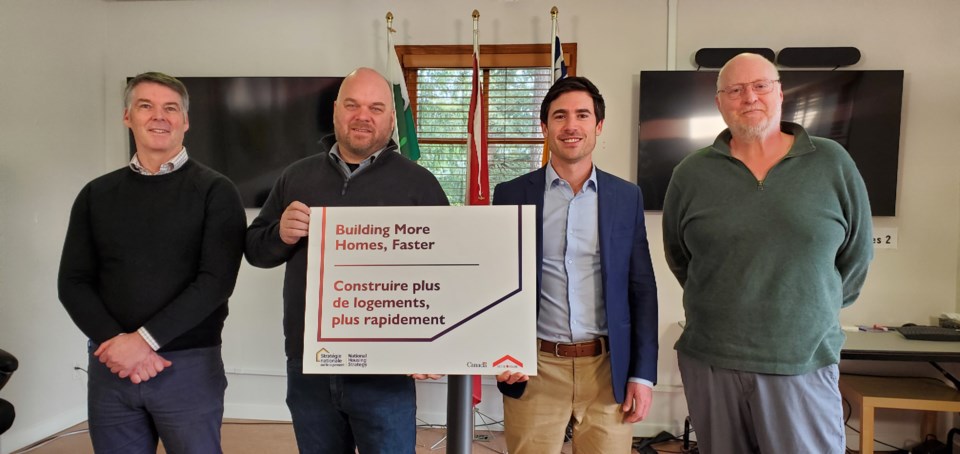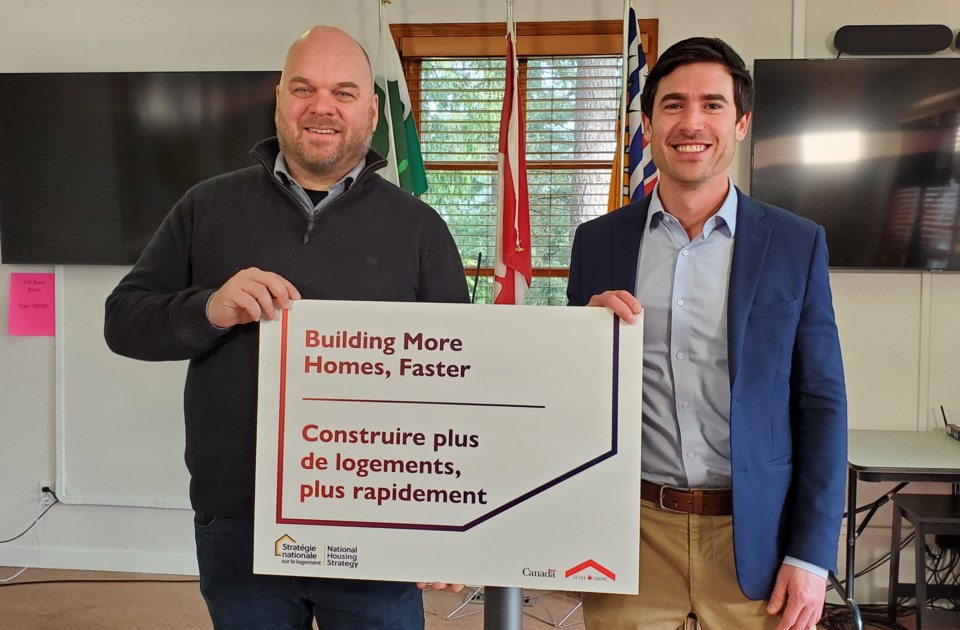Patrick Weiler was on Bowen Island Friday to announce plans to build more than 100 homes on the island over the next decade.
The MP for West Vancouver – Sunshine Coast – Sea to Sky Country, speaking on behalf of federal housing minister Sean Fraser, joined Mayor Andrew Leonard to unveil the details of $1.6 million in funding for the municipality through the federal Housing Accelerator Fund (HAF). MP Weiler spoke to the increasing attractiveness of the island as a place to call home, noting the substantial population jump during the pandemic.
“That demand to be here… has not changed the character of this place. But it has created challenges for locals to find a place for themselves or their kids. And it's also created a challenge to find places to live for people that keep this island running, especially in the summer,” he said.
Weiler explained the funding will “deliver significant lasting changes to the way that homes are built on-island, changes that will tear down the barriers and stumbling blocks that slows housing down.”
On Bowen, those changes mean amending several current requirements for home building. These include establishing development cost charges and a digital e-permitting system, reducing minimum parking requirements for developments, and establishing a plan to make public lands available for affordable housing. The new initiatives are predicted to help bring 35 new housing units to the island over the next three years, with a total of 114 expected over the next 10 years.
“What we're seeing in terms of the changes that need to happen at the municipal level is really doing some planning to create the conditions that will allow the building of new housing,” said Leonard. “We know that things like permitting can take a long time. We know that some of the regulations like parking standards can impede the creation of new housing and land use on specific lots that are being built for housing.”
The agreement will also emphasize relationships with local non-profit housing societies looking to build on Bowen. Both Weiler and Leonard lauded the efforts made by Bowen Island Resilient Community Housing (BIRCH) and the Lookout Society in working toward a 24-unit rental housing project on Miller Road. Earlier in the week the provincial Community Housing Fund announced this project will be included in its next round of funding.
“The HAF funding here from the federal level will certainly help support projects like BIRCH’s, and other projects moving forward, that may advance as this climate of providing new housing – and particularly affordable housing – is underway,” said the mayor.

“There’s two forks – one is supporting (housing) projects that already exist, and the other one is applying funding to some of the planning tools that will create the conditions for more housing to be built,” said Leonard of the overall HAF funding package.
While the island’s population has grown overall recently, Leonard says he hopes the new funding will reduce the stories of residents who find themselves unable to stay on Bowen. “We know that every year we lose neighbors, we lose friends to housing insecurity… they're often getting displaced and priced out of the market on this island,” said Leonard.
“Through the work that our council has done and the work that our staff here has done at the municipality, creating more diverse sources of housing has been identified as a strategic priority of the municipality. This funding will go a long way in helping create those opportunities,” he added.
The mayor was asked if he could envision future density development outside of Snug Cove, where housing projects such as the future BIRCH project or the island's apartment building are located. “I think it's a possibility. We're seeing proposals and desires from the community, for example, for projects that would lead to more density, whether it's tiny home communities or small-scale apartment building units. There is benefit to be had by building density – costs come down, costs gets shared, the infrastructure connections get shared.”
“That said, there is an Official Community Plan review that's going to be coming along where we do specifically look at sustainable development, so that we're able to balance any density increases that we have with the actual tangible limits of our ecosystems and social fabric of our communities,” said Leonard.
The mayor also spoke to the importance of implementing development cost charges (DCC), which charges new developments in order to help fund the infrastructure necessary to accommodate more people in a community. Bowen has DCC in place on parks, but not water or sewage. “We have not had those for the 25 years since the municipality was created, and it's unusual to see that across our other neighbouring jurisdictions… it is work that has to be done if we are going to sustainably build new housing while at the same time managing our own costs within the municipality to deliver the infrastructure,” said Leonard.
The mayor added this would prompt an investigation of where future growth should take place on Bowen in order to best utilize and establish the infrastructure made available through increased DCC.



